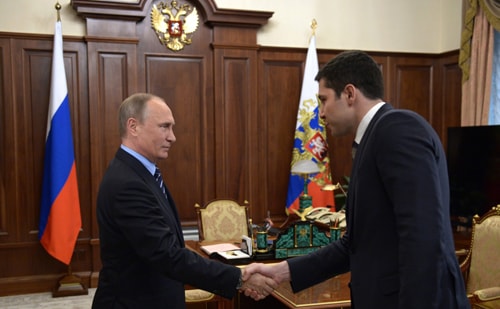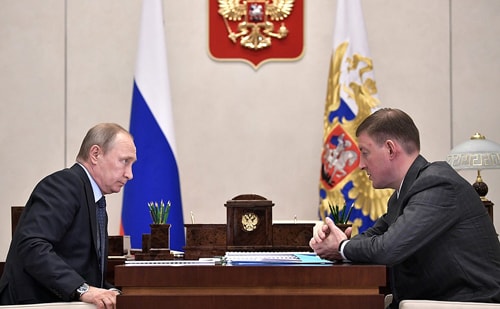Young stars in Russian politics shine under Putin
Putin's government restructuring has seen the rise of younger leaders who could take over power when he steps down.
|
Governor Anton Alikhanov (right) shakes hands with Russian President Vladimir Putin in 2016. Photo:Wikimedia. |
Every time Anton Alikhanov looks up from his desk in the Kaliningrad governor’s office, he sees a blue folder hanging on the wall. It is a folder filled with complaints from residents of the region, brought to Alikhanov’s office by Russian President Vladimir Putin when he first visited the region last August, according toFT.
“It’s framed in glass and hung there, as a reminder of the nature of our work,” Alikhanov said. “Work.”
After being appointed Russia's youngest governor at the age of 30 in October 2016, Alikhanov joined a group of "new stars" in the government promoted by President Putin to prepare for a future power transition.
With Putin likely to be re-elected in the presidential election on March 18, "young stars" like Alikhanov will become increasingly influential in Russian politics. According to the Russian constitution, this could be Putin's last presidential term and the powerful leader will likely step aside in 2024, when he will be 71 years old, handing over responsibilities to "stars" who have gradually matured under his guidance.
“The upcoming presidential election will mark the beginning of a post-Putin Russia, regardless of whether he remains in power for the next six or 16 years,” said political scientist Ivan Krastev, president of the Center for Liberal Strategies in Sofia, Bulgaria, and Gleb Pavlovsky, a former Kremlin physician.
President Putin also sent strong signals about this change, when he repeatedly mentioned the "government of the future" or "new government" in his State of the Nation Address on March 1. When talking about domestic and economic policy, Putin outlined broad goals but did not give specific instructions. It seems that he wants to gradually withdraw from the micro-domestic issues that have helped him attract great support from the people, to focus more on security and foreign policy.
“They are focusing on strengthening political institutions,” said Tatyana Stanovaya, head of the analysis department at the Center for Political Technologies in Moscow. “The whole system needs to be restructured so that it can continue to function without Putin, but in the direction he has set.”
At the core of this restructuring effort is a group of young politicians like Alikhanov. While they have different styles, political analysts say they all belong to a new technocratic class, very different from the senior officials who dominate Putin’s administration and cabinet today.
“If this new generation prevails, Russia will be a country led by economists loyal to Mr. Putin and will continue his policies after he leaves,” Krastev and Pavlovsky write.
|
Putin is likely to be re-elected in the upcoming election. Photo:Reuters. |
Over the past three years, Putin has replaced 36 of the country's 85 regional governors, including 20 new governors under the age of 50. His restructuring campaign has reduced the average age of Russian governors from 55 to 46.
Other Russian government agencies have also seen strong new winds. In August 2016, Putin replaced 65-year-old Chief of Staff Sergei Ivanov, a former KGB official, with 46-year-old Anton Vaino, a relatively unknown diplomat. In the cabinet, Deputy Finance Minister Maxim Oreshkin was appointed Minister of Economy in November 2016, at the age of 34.
If Putin is re-elected in the upcoming election, his cabinet is expected to undergo further major changes, with older members of the old cabinet being replaced. President Putin plans to retain his longtime partner Dmitry Medvedev as Prime Minister, but Medvedev's team is likely to undergo significant personnel changes.
However, there is still no real star in this team to be chosen as Putin's successor. "It's still too early," said Evgeny Minchenko, a political consultant. "So far, Putin has only built the foundation by introducing a new generation of leaders."
Challenges and opportunities
Two people close to Sergei Chemezov, the head of Russia's top arms conglomerate Rostec, claim he backed Alikhanov's appointment as governor of the Kaliningrad region, in an effort to maintain influence over the country's future leaders.
However, the move by the central government in Moscow to put a person from the capital to lead the Kaliningrad region, a strategic area bordering Poland and the Baltic region, has caused a lot of controversy.
|
Andrei Turchak (right), 42, governor of the Pskov region, reports to Mr. Putin in 2016. Photo:Kremlin.ru. |
After a year and a half in power, Alikhanov has clashed bitterly with local elites. Business leaders have criticized the young governor's creation of a special economic zone in the region, and activists have been unhappy with state media insults against Kaliningrad residents who want to preserve the cultural heritage of their ethnic German population.
Alikhanov was impatient with these disagreements. When asked about Kaliningrad's special identity, he declared that the region "has no identity of its own and cannot have any identity other than Russian".
However, the young governor believes this is the challenge he needs to overcome in his career. With Putin's blue folder hanging on the wall as a daily reminder, Alikhanov sees the position of governor of Kaliningrad as an opportunity to prove himself.
“I think it’s right to send young leaders to remote areas because it helps them to challenge themselves, to be trained and to understand life outside the fancy offices in Moscow,” Alikhanov said. “It’s great if they do well, but if they don’t, they fail the test.”
Andrei Nikitin, 38, who was appointed governor of Novgorod in February last year, faces the task of restoring the impoverished region to its former glory. To do this, Nikitin plans to apply the economic knowledge he learned in Sweden to his work.
Drawing on his experience as an economist, Niktin wanted to examine the measures being taken in different regions to find the most suitable solutions to boost Novgorod's growth. "I asked my subordinates to visit Tula province and find out why they have fewer civil servants than us despite their larger area," he said. "They came, observed, and we cut 30% of civil servants last year. It turned out they were all unnecessary civil servants."




